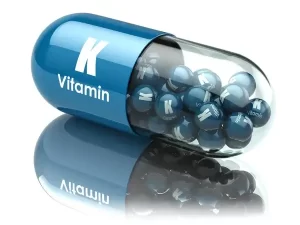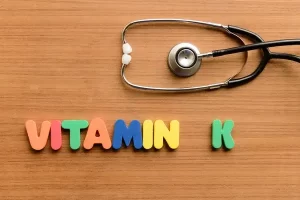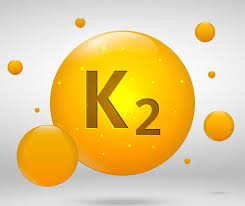Content of the Article
The benefits of vitamin K include improving bone health and promoting blood clotting. It is a fat-soluble vitamin that also plays an important role in heart health. It also improves brain function and protects against cancer. Since vitamin K activates the protein responsible for clot formation in the blood, blood cannot clot without this vitamin.
Vitamin K taken from food affects the intestinal bacteria. Therefore, the current level of vitamin K in the body affects intestinal or digestive health.
Among the benefits of vitamin K are its functions such as preventing heart disease. Studies have shown that getting more of this vitamin from food lowers the risk of dying from heart disease. That's why vitamin K deficiency is so dangerous.

Types of Vitamin K
There are two main types of vitamin K we get from food: vitamin K1 and vitamin K2.. Vitamin K1 is found in vegetables, while vitamin K2 is found in dairy products and is produced by bacteria in the gut.
The best way to meet the daily vitamin K requirement, green leafy vegetablesEating foods that contain vitamin K, such as broccoli, cabbage, fish, and eggs.
There is also a synthetic version of vitamin K, also called vitamin K3. However, taking the necessary vitamin in this way is not recommended.
Vitamin K Benefits for Babies
Researchers have known for years that newborn babies have lower levels of vitamin K in their bodies than adults and are born with a deficiency.
This deficiency, if severe, can cause a hemorrhagic disease in infants known as HDN. Severe deficiency is more common in preterm infants than in breastfed infants.
The low level of vitamin K in newborns is attributed to both lower bacterial levels in their intestines and the inability of the placenta to carry the vitamin from mother to baby.
In addition, it is known that vitamin K exists in lower concentrations in breast milk. This is why breastfed babies tend to be more deficient.
Benefits of Vitamin K

Supports heart health
- Vitamin K helps prevent calcification of the arteries, one of the leading causes of heart attack.
- It prevents the hardening of the arteries.
- Found naturally in gut bacteria Vitamin K2 This is especially true for.
- Some studies show that vitamin K is a critical nutrient for both reducing inflammation and protecting the cells that line blood vessels.
- Consuming the right amount is important for keeping blood pressure within the healthy range and reducing the risk of cardiac arrest (stopping or ending of the heart's pumping function).
Improves bone density
- One of the benefits of vitamin K is that it reduces the risk of osteoporosis.
- On top of that, some research has found that high intakes of vitamin K can halt bone loss in people with osteoporosis.
- Our bodies need vitamin K to use the calcium needed to build bones.
- There is evidence that vitamin K may improve bone health and reduce the risk of bone fractures, particularly in postmenopausal women at risk for osteoporosis.
- According to recent studies, men and women who consumed high amounts of vitamin K2 were 65% less likely to suffer a hip fracture compared to those who consumed less.
- In bone metabolism, vitamin K and D work together to improve bone density.
- This vitamin positively affects the calcium balance in the body. Calcium is an important mineral in bone metabolism.
Menstrual pain and bleeding
- Regulating the function of hormones is one of the benefits of vitamin K. Helps reduce PMS cramps and menstrual bleeding.
- Since it is a blood-clotting vitamin, it prevents excessive bleeding during the menstrual cycle. It has pain relief properties for PMS symptoms.
- Excessive bleeding leads to cramping and pain during the menstrual cycle.
- PMS symptoms also worsen when vitamin K is deficient.
Helps fight cancer
- Another benefit of vitamin K is that it reduces the risk of prostate, colon, stomach, nose and mouth cancers.
- One study found that taking high doses helped patients with liver cancer and improved liver function.
- Another study showed that in a Mediterranean population at high risk of heart disease, a dietary increase in the vitamin lowered the risk of heart, cancer, or all-cause death.
Helps blood clot
- One of the benefits of vitamin K is that it helps blood to clot. It prevents the body from bleeding or bruising easily.
- The blood coagulation process is very complex. Because in order for the process to be completed, at least 12 proteins must work together.
- Four of the coagulation proteins require vitamin K for their activity; Therefore, it is an important vitamin.
- Because of its role in blood clotting, vitamin K plays an important role in helping to heal bruises and cuts.
- Hemorrhagic disease of the newborn (HDN) is a condition in which blood clotting does not occur properly. This develops in newborn babies due to vitamin K deficiency.
- One study concluded that an injection of vitamin K should be given to the newborn at birth to safely eliminate HDN. This app has been proven to be harmless for newborns.
Improves brain function
- Vitamin K-dependent proteins play particularly important roles in the brain. This vitamin participates in the nervous system by being involved in the metabolism of sphingolipid molecules that occur naturally in brain cell membranes.
- Sphingolipids are biologically potent molecules with a wide variety of cellular actions. It has a role in brain cell production.
- In addition, vitamin K has anti-inflammatory activity. It protects the brain against oxidative stress caused by free radical damage.
- Oxidative stress damages cells. It is thought to be involved in the development of cancer, Alzheimer's disease, Parkinson's disease and heart failure.
Protects the health of teeth and gums
- A diet low in fat-soluble vitamins such as vitamins A, C, D, and K causes gum disease.
- Prevention of tooth decay and gum disease depends on increasing the intake of fat-soluble vitamins that play a role in bone and tooth mineralization.
- A diet rich in vitamins and minerals helps kill harmful acid-producing bacteria that live in the mouth and damage teeth.
- Vitamin K works with other minerals and vitamins to kill bacteria that damage tooth enamel.
Increases insulin sensitivity
- Insulin is the hormone responsible for transporting sugar from the bloodstream to tissues where it can be used as energy.
- When you consume high amounts of sugar and carbohydrates, the body tries to produce more insulin to keep up. Unfortunately, producing high levels of insulin, insulin resistance leads to a condition called This reduces its effectiveness and results in increased blood sugar.
- Increasing vitamin K intake provides insulin sensitivity to keep blood sugar levels within the normal range.

What's In Vitamin K?
Insufficient intake of this vitamin causes bleeding. It weakens bones. It increases the risk of developing heart disease. For this reason, we need to get the vitamin K that our body needs from food.
Vitamin K is a group of compounds divided into two groups: Vitamin K1 (phytoquinone) ve Vitamin K2 (menaquinone). Vitamin K1, the most common form of vitamin K, is found in plant foods, especially dark leafy green vegetables. Vitamin K2 is found only in animal foods and fermented plant foods. Here is the list of foods containing vitamin K…
Foods with the most vitamin K
- Kale cabbage
- Mustard
- Chard
- Collard greens
- Spinach
- Broccoli
- Brussels sprouts
- Beef liver
- Chicken
- goose liver
- Green beans
- Dried plum
- Kiwi
- Soy oil
- Cheese
- Avokado
- Pea
Which vegetables contain vitamin K?
The best sources of vitamin K1 (phytoquinone) dark leafy green vegetablesd.
- Kale cabbage
- Mustard
- Chard
- Collard greens
- Beet
- Parsley
- Spinach
- Broccoli
- Brussels sprouts
- Cabbage
Meats with Vitamin K
The nutritional value of meat varies according to the diet of the animal. Fatty meats and liver are excellent sources of vitamin K2. Foods containing vitamin K2 include:
- Beef liver
- Chicken
- goose liver
- Duck breast
- beef kidney
- chicken liver
Dairy products containing vitamin K
dairy products and egg It is a good source of vitamin K2. Like meat products, the vitamin content varies according to the animal's diet.
- hard cheeses
- soft cheeses
- Egg yolk
- stager
- Whole milk
- Butter
- Cream
Fruits with Vitamin K
Fruits generally do not contain as much vitamin K1 as leafy green vegetables. Still, some contain good amounts.
- Dried plum
- Kiwi
- Avokado
- Blackberry
- Blueberries
- Pomegranate
- Fig (dry)
- Tomatoes (sun dried)
- Grape
Nuts and legumes with vitamin K
Some common items of pulse ve nutsprovides a good amount of vitamin K1, though less than green leafy vegetables.
- Green beans
- Pea
- Soybean
- Cashew
- Peanut
- Pine nuts
- Walnut
What is Vitamin K Deficiency?
When there is not enough vitamin K, the body goes into emergency mode. It immediately performs critical functions needed for survival. As a result, the body becomes vulnerable to destruction of vital processes, weakening of bones, development of cancer and heart problems.
If you do not get the required amount of vitamin K, serious health problems occur. One of them is vitamin K deficiency. vitamin K An individual with a deficiency should first consult a doctor for an accurate diagnosis.
Vitamin K deficiency occurs as a result of poor diet or poor dietary habits.
Vitamin K deficiency is rare in adults, but newborn babies are particularly at risk. The reason why vitamin K deficiency is rare in adults is because most foods contain adequate amounts of vitamin K.
However, certain medications and certain health conditions can interfere with the absorption and formation of vitamin K.

Vitamin K Deficiency Symptoms
The following symptoms occur in vitamin K deficiency;
Cuts bleeding excessively
- One of the benefits of vitamin K is that it promotes blood clotting. In case of deficiency, blood clotting becomes difficult and causes excessive blood loss.
- This means a dangerous loss of blood, increasing the risk of death after being seriously injured.
- Heavy menstrual periods and nosebleeds are some conditions that need attention to vitamin K levels.
Weakening of bones
- Keeping bones healthy and strong is perhaps the most important of the benefits of vitamin K.
- Some studies link adequate vitamin K intake to higher bone mineral density.
- Deficiency of this nutrient can lead to osteoporosis.
- Therefore, in case of deficiency, pain is felt in the joints and bones.
Easy bruising
- The bodies of those with vitamin K deficiency easily turn bruises at the slightest blow.
- Even a small bump can turn into a large bruise that doesn't heal quickly.
- Bruising is quite common around the head or face. Some people have small blood clots under their fingernails.
Gastrointestinal problems
- Inadequate intake of vitamin K leads to different gastrointestinal problems.
- This increases the risk of gastrointestinal hemorrhage and bleeding. This increases the likelihood of blood in the urine and stool.
- In rare cases, it causes bleeding in the mucous membrane inside the body.
Bleeding gums
- Bleeding gums and dental problems are common symptoms of vitamin K deficiency.
- Vitamin K2 is responsible for activating a protein called osteocalcin.
- This protein carries calcium and minerals to the teeth, the deficiency of which inhibits this mechanism and weakens our teeth.
- The process causes tooth loss and excessive bleeding in the gums and teeth.
The following symptoms may also occur in vitamin K deficiency;
- Bleeding within the digestive tract.
- Blood in the urine.
- Defective blood coagulation and hemorrhages.
- Higher coagulation events and anemia.
- Excessive calcium deposition in soft tissues.
- Hardening of the arteries or problems with calcium.
- Alzheimer's disease.
- Decreased prothrombin content in the blood.
What Causes Vitamin K Deficiency?
The benefits of vitamin K appear in many vital bodily functions. It is important to eat foods rich in this vitamin. Deficiency of the vitamin is often caused by poor eating habits.
Vitamin K deficiency is a very serious problem. It should be resolved by consuming natural foods or nutritional supplements. Vitamin K deficiency is rare, as bacteria in the large intestine can produce it internally. Other conditions that can cause vitamin K deficiency include:
- gallbladder or cystic fibrosis, celiac diseasehealth problems such as biliary disease and Crohn's disease
- Liver disease
- taking blood thinners
- severe burns
Vitamin K Deficiency Treatment
If the person is diagnosed with a vitamin K deficiency, they will be given a vitamin K supplement called phytonadione. Phytonadione is usually taken by mouth. However, it can also be given as an injection if the person has difficulty absorbing the oral supplement.
The dose given depends on the age and health of the individual. The usual dose of phytonadione for adults ranges from 1 to 25 mcg. Generally, vitamin K deficiency can be prevented with a proper diet.

What Diseases Does Vitamin K Deficiency Cause?
Here are the diseases seen in vitamin K deficiency…
Cancer
- Studies have shown that a person with the highest intake of vitamin K has the lowest risk of developing cancer and has a 30% reduction in the likelihood of cancer.
Osteoporosis
- High levels of vitamin K increase bone density, while low levels cause osteoporosis.
- Osteoporosis is a bone disease characterized by weak bones. This can lead to major problems, such as the risk of fractures and falls. Vitamin K improves bone health.
Cardiovascular problems
- Vitamin K2 helps prevent hardening of the arteries that causes coronary artery disease and heart failure.
- Vitamin K2 can also prevent calcium deposits in the artery linings.
Excessive bleeding
- As we know, the benefits of vitamin K include blood clotting.
- Vitamin K helps reduce the risk of bleeding in the liver.
- Vitamin K deficiency can cause nosebleeds, blood in the urine or stool, tarry black stools, and heavy menstrual bleeding.
Heavy menstrual bleeding
- The main function of vitamin K is blood clotting.
- Low levels of vitamin K in our body can cause heavy menstrual periods.
- Therefore, for a healthy life, it is necessary to consume foods rich in vitamin K.
Bleeding
- Vitamin K deficiency bleeding (VKDB) is called a bleeding condition in newborn babies. This disease is also called hemorrhagic disease.
- Babies are normally born with low vitamin K. Babies are born without bacteria in their guts and do not get enough vitamin K from breast milk.
Easy bruising
- Vitamin K deficiency can cause bruising and swelling. This will lead to excessive bleeding. Vitamin K can reduce bruising and swelling.
Aging
- Vitamin K deficiency can cause wrinkles in your smile lines. Therefore, it is important to consume vitamin K to stay young.
Hematomas
- Vitamin K is an essential nutrient for coagulation mechanisms, preventing continuous bleeding. This vitamin reverses the blood thinning process.
Birth defects
- Vitamin K deficiency can lead to birth defects such as short fingers, flat nose bridges, parched ears, underdeveloped nose, mouth and face, mental retardation, and neural tube defects.
Poor bone health
- Bones need vitamin K to use calcium properly.
- This helps build and maintain the strength and integrity of bones. High levels of vitamin K provide greater bone density.
How Much Vitamin K Should You Take A Day?
The recommended daily intake (RDA) for vitamin K depends on gender and age; It is also associated with other factors such as breastfeeding, pregnancy and illness. The recommended values for adequate intake of vitamin K are as follows:
Babies
- 0 - 6 months: 2.0 micrograms per day (mcg / day)
- 7 - 12 months: 2.5 mcg / day
children
- 1 - 3 years old: 30 mcg / day
- 4-8 years old: 55 mcg / day
- 9 - 13 years old: 60 mcg / day
Adolescents and Adults
- Men and women 14 - 18: 75 mcg / day
- Men and women 19 years and older: 90 mcg / day

How to prevent vitamin K deficiency?
There is no specific amount of vitamin K you should consume each day. But nutritionists find, on average, 120 mcg per day sufficient for men and 90 mcg for women. Some foods, including green leafy vegetables, are extremely high in vitamin K.
A single dose of vitamin K at birth can prevent deficiency in newborns.
People with conditions involving fat malabsorption should speak to their doctor about taking vitamin K supplements. The same is true for people taking warfarin and similar anticoagulants.
Vitamin K Harms
Here are the benefits of vitamin K. What about the damages? Vitamin K damage does not occur with the amount taken from food. It usually occurs as a result of overuse of supplements. You should not take vitamin K in doses higher than the daily required amount.
- Do not use vitamin K without consulting a doctor in conditions such as stroke, cardiac arrest, or blood clots.
- If you take blood-thinning medications, you should be careful not to consume foods rich in vitamin K. Because it can affect the function of these drugs.
- If you are going to use antibiotics for more than ten days, you should try to get more of this vitamin from food, as antibiotics can kill bacteria in the intestines that allow the body to absorb vitamin K.
- Medicines used to lower cholesterol reduce the amount absorbed by the body and can also reduce the absorption of fat-soluble vitamins. Try to get enough vitamin K in case you take these types of medications.
- Be careful when using vitamin E supplements. Because Vitamin E may interfere with the function of vitamin K in the body.
- Vitamin K can interact with many medications, including blood thinners, anticonvulsants, antibiotics, cholesterol-lowering medications, and weight loss medications.
- If anticonvulsants are taken during pregnancy or breastfeeding, the fetus or newborn Vitamin K deficiency increases the risk.
- Cholesterol-lowering drugs inhibit fat absorption. vitamin K Fat is necessary for absorption, so people taking this drug are at higher risk of deficiency.
- People taking any of these drugs should consult their doctor about the use of vitamin K.
- The best way to ensure that the body has enough nutrients is to eat a balanced diet with plenty of fruits and vegetables. Supplements should only be used in case of deficiency and under medical supervision.
To summarize;
The benefits of vitamin K include blood clotting, protection against cancer, and strengthening bones. It is one of the fat-soluble vitamins that plays an important role in many areas of health.
There are two main types of this important vitamin: Vitamin K1 is commonly found in plant foods as well as green leafy vegetables, while vitamin K2 is found in animal products, meat and dairy products.
The daily amount of vitamin K needed can vary by age and gender. However, nutritionists recommend, on average, 120 mcg for men and 90 mcg for women per day.
Vitamin K deficiency occurs when the body does not have enough of this vitamin. Deficiency is a very serious problem. It can cause symptoms such as bleeding and bruising. It should be treated by taking foods containing vitamin K or taking vitamin K supplements.
However, taking supplements in excess can cause some health problems. Vitamin K can interact with some medications. Therefore, it should be used with caution.










